NevadaToday
Sage advice: growing tomorrow's mentors Mentorship and student support systems in the Reynolds School of Journalism
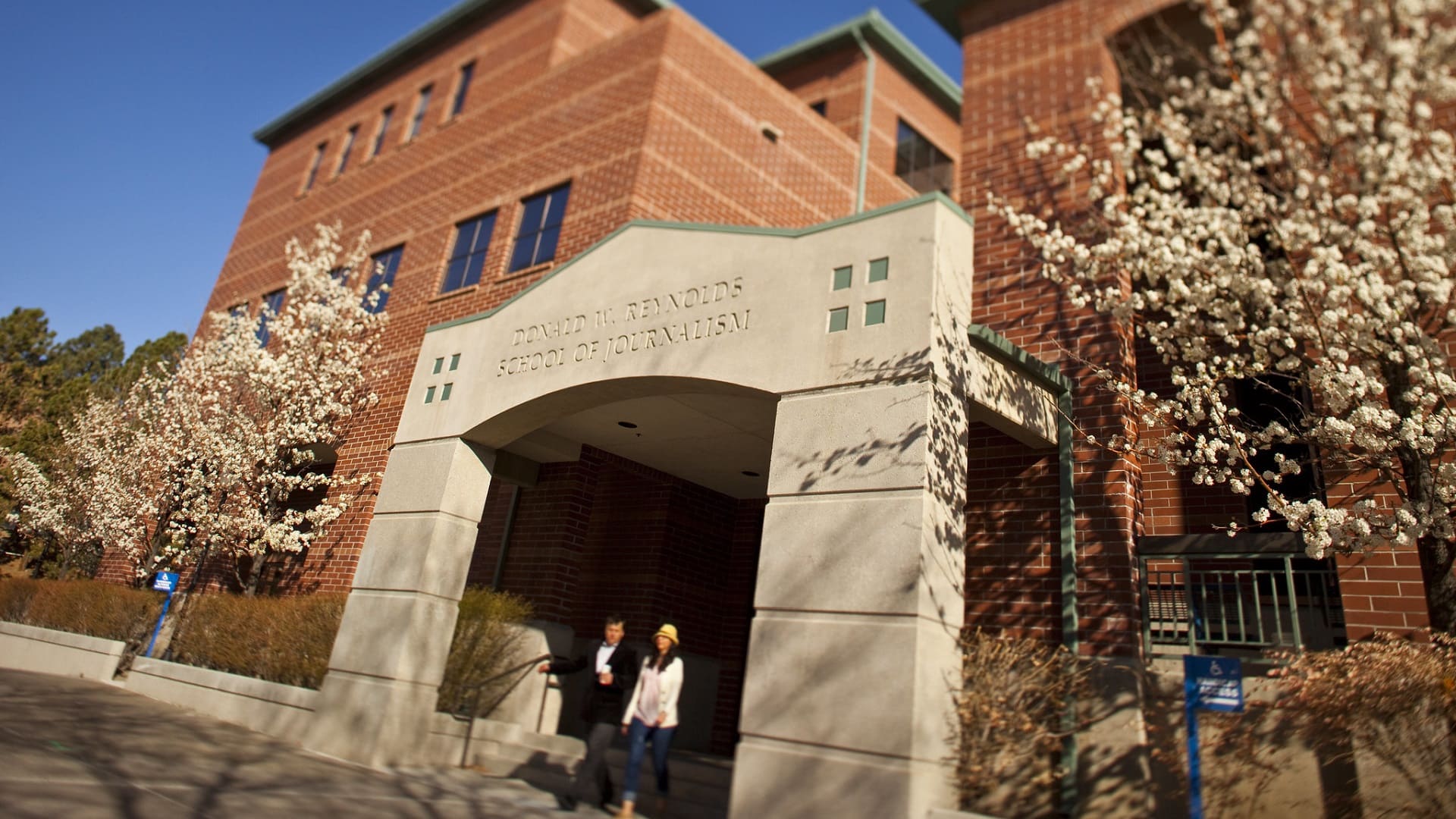
Sage advice: growing tomorrow's mentors
At the ripe old age of 22, Reynolds School of Journalism alumnus Daniel Lindbergh Lang is noticeably infused with a lifetime of other people’s wisdom – the result of seemingly several lifetimes’ worth of mentoring experience.
Following four years of student successes, a nonstop array of activities and a variety of mentorships, Lang received his bachelor’s degree with honors from the Reynolds School in May 2019, with an emphasis in strategic communications.
To say he is a proponent of mentoring is the proverbial understatement. One could quite easily envision him as a national mentoring spokesperson.
Interviewed from his Peace Corps post in Orkhon Province, Mongolia, Lang said he loves his work teaching English to students attending the region’s public university – and he loves mentoring.
“The biggest thing about mentoring in all its forms,” Lang said, “is that it continues to widen my perspectives on life, university studies, career and basically everything I’ve been mentored on.”
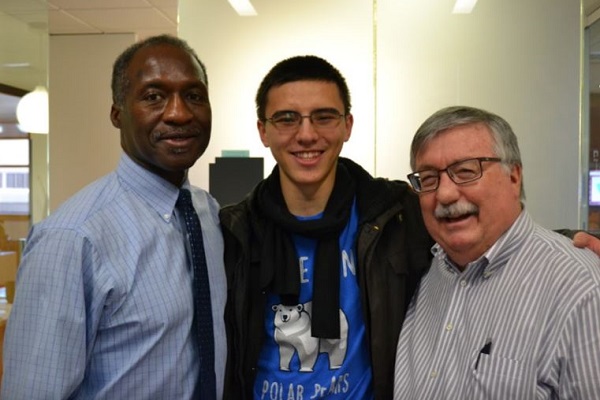
Lang’s affinity for mentoring goes back to his early high school days. As a freshman at the Advanced Technologies Academy in his hometown of Las Vegas, he recalled that student ambassadors would visit freshman classes each month to give advice about making the most of high school. That experience motivated him to get involved. As a student ambassador in his junior and senior years, he was establishing the habit of giving back, working closely with his high school counseling office to enhance the ambassador program.
Then, as a high school junior, he attended Nevada Boys State, a program focused on building legislative and leadership skills. “I was mentored there by the counselors,” Lang said. “I felt so moved by how much how they taught us, how the mentors gave freely. Realizing I could give back like that was freeing.”
More than just an advisor
While one definition of a mentor is “an experienced and trusted advisor,” Lang defines it more broadly from the perspective of the value that mentoring plays in his life. “I’d say mentoring is any form of supporting someone in a personal way, based on personal experiences of the mentor,” he said. “It encompasses all sorts of facets of life, whether industry-related or your personal life, relationship-building or family relationships, or even spiritual aspects.”
Lang includes his thesis advisors, those who guided him during his college internships at the University of Nevada Press and the Roman Catholic Diocese of Reno, as well as a number of spiritual mentors as part of his Catholic faith.
When Lang entered the Reynolds School with a focus on a career in advertising, mentoring quickly became central to his university experience. In his junior year, Lang was actively involved in the Student Journalism Student Council at the Reynolds School. Based on a needs assessment conducted among journalism students, the council added student-to-student mentoring to its offering of activities.
“We had other programs offering mentoring by professionals,” Lang said. “We valued that personal side of mentorship, not just ‘what classes to take, what clubs to join.’ It’s been great because when students are going the same direction, it’s wonderful to watch them flourish, right from their freshman year, so they can get involved as early as possible.”
Lang cites journalism Professor Emeritus Bob Felten as a top mentor, affirming Felten’s well-known popularity among students during his 30 years teaching advertising and marketing.
Felten served as the Reynolds School’s faculty advisor to the student advertising club, of which Lang was president. “Daniel would often stop by my office with questions,” Felten said, “about how to be a better leader as president of the student advertising club, how to be a better teammate as a member of the National Student Advertising Competition team and how to get a ride to an event downtown. What he never seemed to need was advice on balancing his many, many responsibilities.”
Lang was indeed seeking leadership advice from Felten. Given Lang’s self-admitted tendency to share his own approaches and knowledge, Felten had some insights that surprised Lang. “His advice for me was to not give the first answer when posing a problem. Just allow there to be silence in the room; allow other members to propose solutions. I really loved that.”
Lang would go on to choose Felten as his senior scholar mentor because of advice like that. “It took a lot of decision making because I love the faculty of the Reynolds School. They’re all great. It was because of those little talks like that that I ended up choosing Bob.”
Sage advice: listen, be on time
“Daniel always sought out challenging learning opportunities. He is quite fearless,” Felten said. “More, Daniel’s interests reached far beyond our campus. He studied in China, conducted market research in Taiwan and had Chinese Studies as one of his three minors. He is most certainly a citizen of the world. Overall, I believe we had and still have a strong relationship based on mutual respect."
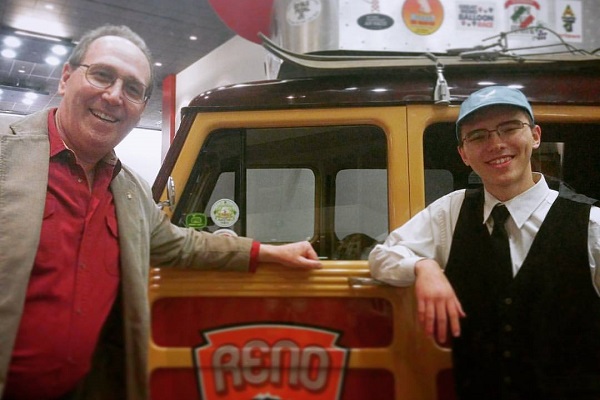
Lang gained valuable insights from a variety of mentors, including Michael Eardley, owner/producer of Tanglewood Studios, a Reno-based recording studio.
“Daniel has no bounds to his interests,” Eardley said. “He’s involved in religion and politics and journalism. I think it’s very important for the students to realize the real world operates on a different platform, and anything we can do to get their feet on the ground before they leave school is extremely important. They are the future.”
Lang’s mentors have helped him with listening skills, empathy, communication, confidence and professionalism. Lang still remembers the advice Eardley gave him early on: “I was a little late for a meeting, and he talked to me. ‘In the workplace, if you’re late for a meeting, that is a big no.’ That really struck me as an underclassman undergrad. ‘Oh, dang, I need to get it together.’”
Mentors: helping students, giving back
Felten’s longtime colleague, Reynolds School lecturer Alison Gaulden, serves as faculty advisor to the Nevada chapter of the Public Relations Student Society of America (PRSSA Nevada), a Reynolds School student club. She has witnessed firsthand how mentoring supports student success in a variety of ways.
“Number one is connecting to professionals in the field to get direct advice,” Gaulden said. “Many students may or may not have parents in the industry, so they can’t really guide them or share with them. Whereas a professional in the field is committed to saying, ‘Yes, I will meet with you; I’ll help answer your questions.’ The students start building those networks and those relationships, which can become mentor relationships. They’ll look out for them and keep the student top of mind when an internship or job opportunity becomes available.”
“This generation of students has far more on their plate; they have to have far more skills than when I graduated back in the day. ... The mentor instills a sense of ‘You can do this job; you are enough as you are,’ to help them navigate the transition into the work world."
From Gaulden’s experience mentoring dozens of Reynolds School students over the years, mentors benefit as well as the students. “For me, it is a way to give back. This generation of students has far more on their plate; they have to have far more skills than when I graduated back in the day,” Gaulden said. “There are so many students with anxiety, ‘imposter syndrome,’ and FOMO (fear of missing out), and having a mentor helps ground them. The mentor instills a sense of ‘You can do this job; you are enough as you are,’ to help them navigate the transition into the work world.”
For Gaulden, it’s both personal and professional. “I come from blue-collar parents, and I’m a first-generation college graduate. I didn’t have someone who could make the introductions or open the doors or tell me how this worked,” she said. “I just want to give back to the industry that has given me so much, in the relationships I have, to the next generation.”
Mentoring: not one size fits all
In her role as faculty advisor for the students in PRSSA, Gaulden mentors the organization’s student board. “I teach them how to mentor the other members of the board so that everyone is successful,” Gaulden said.
The leaders being mentored include two-time club president Camie Yokote. A University of Nevada, Reno senior, Yokote is taking 18 credits this spring semester. Completing her final 12 credits in the fall will allow her to graduate in December. Yokote is receiving her minor in journalism with a public relations focus. Her minor complements the marketing and finance bachelor’s degree she is pursuing through the College of Business.
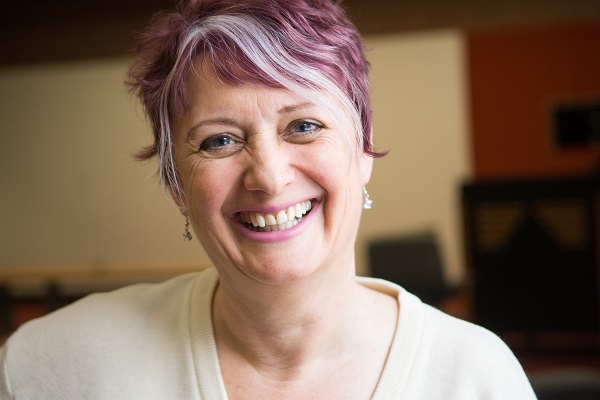
Mentoring is also of high value to Yokote, but with work, an internship and a full class load, mentoring has a limited footprint in her schedule. Since her freshman year, she has taken advantage of opportunities provided through the PRSSA Nevada chapter. The student organization partners with its professional counterpart, the Sierra Nevada chapter of the Public Relations Society of America, to connect professional mentors with public relations students.
“We work to pair students with mentors in the field they’re pursuing,” Yokote said, adding that the program focuses on frequent meetings and regular communication between the student and the professional. Yokote meets monthly in person with her mentor, who is also available as a resource when needed in between their meetings. “You don’t have to be in person. We can do a video chat or text our mentors or email them with questions.”
According to Gaulden, Yokote has made the most of mentoring opportunities despite a full schedule.
“In Camie’s case, you get a new mentor every year, and she started to be involved as a freshman, so she’s met four or five professionals,” Gaulden said. “She has stayed in contact with them and regularly rotates her questions or concerns or ideas through those mentors. And they have helped her connect to ongoing jobs or other internship opportunities – plus giving her advice on how to maximize her collegiate experience. Already, Camie has lifelong friends in the people she has been mentored by.”
Instrumental to career success
With graduation now approaching, Yokote sees the value of mentoring in terms of career opportunities. “It’s having references and people who know me and know my work style,” she said. “Those are professionals I’ve worked with, who know my work ethic, who have seen me in a work environment rather than just as a friend, who have a professional opinion on my professional work. And the connections are also important.”
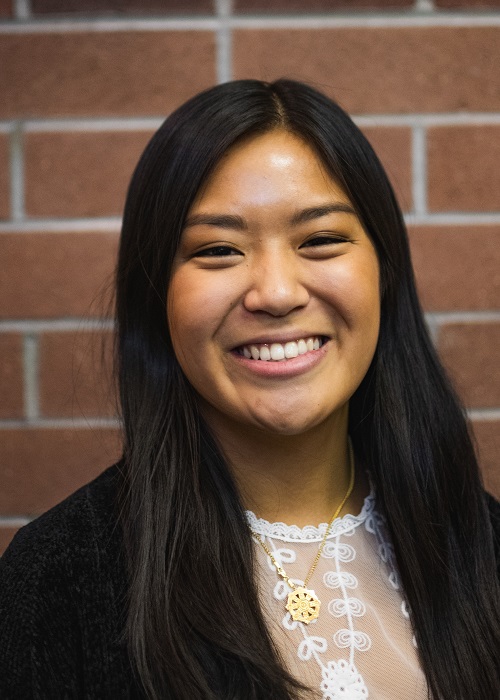
Were it not for having mentors, Yokote said her university experience would have been far different. “I would be so lost; I wouldn’t know where to begin,” she said. “Talking to my mentors and hearing how they got where they are, eliminating things I was doing that weren’t beneficial to me or others. I would have kept doing things just to do it; I would have gotten burned out. I wouldn’t have had their experience to use as my own and draw off of, that person to bounce things off of to gain their insights.”
Just as Lang had his own early mentoring influences, Yokote started Japanese drumming known as Taiko at age six. Having a sensei serve as her mentor, and Camie mentoring the younger Taiko players, may have planted seeds for future mentoring.
Mentoring brings together people with diverse backgrounds, interests, goals and needs. Yet talking to mentors and mentees, a clear narrative emerges: Those who have been mentored are often those who become mentors to others. Those who become mentors are likely to serve as mentors again.
Students like Lang and Yokote have taken advantage of the high value of mentoring through their involvement with the Reynolds School, its student clubs like PRSSA and the Advertising Club, and other activities as part of their collegiate careers at the University of Nevada, Reno.
Many other campus mentoring opportunities are available to students as well. Students can ask their advisors about how to connect with a mentor or become involved in a program or activity on campus.
Lang sums it up this way: “At the end of the day, we can always take our experiences and give them to someone else and make their life a little better.”



